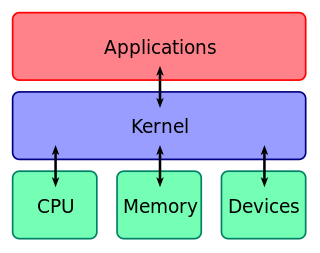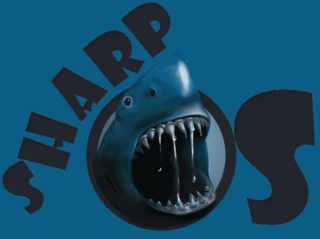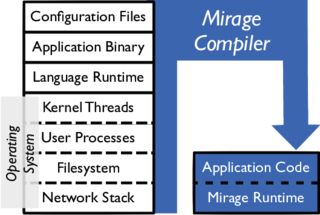 W
WThe kernel is a computer program at the core of a computer's operating system that has complete control over everything in the system. It is the "portion of the operating system code that is always resident in memory", and facilitates interactions between hardware and software components. On most systems, the kernel is one of the first programs loaded on startup. It handles the rest of startup as well as memory, peripherals, and input/output (I/O) requests from software, translating them into data-processing instructions for the central processing unit.
 W
WC# Open Source Managed Operating System (Cosmos) is a toolkit for building operating systems, written mostly in the programming language C# and small amounts of a high level assembly language named X#. Cosmos is a backronym, in that the acronym was chosen before the meaning. It is open-source software released under a BSD license.
 W
WExokernel is an operating system kernel developed by the MIT Parallel and Distributed Operating Systems group, and also a class of similar operating systems.
 W
WA KDL is a term used on BeOS/Haiku and possibly other operating systems for a serious kernel error which causes the computer to drop into the kernel debugger.
 W
WA kernel panic is a safety measure taken by an operating system's kernel upon detecting an internal fatal error in which it either is unable to safely recover or cannot have the system continue to run without having a much higher risk of major data loss. The term is largely specific to Unix and Unix-like systems. For Microsoft Windows operating systems the equivalent term is "Stop error", resulting in a bug check screen that presents the bug check code on a blue background in early versions of Windows, or on a green background on the Xbox One platform as well as in Windows 10 preview builds.
 W
WThe Linux kernel is a free and open-source, monolithic, modular, multitasking, Unix-like operating system kernel. It was conceived and created in 1991 by Linus Torvalds for his i386 based PC, and it was soon adopted as the kernel for the GNU Operating System, which was created as open source and free software, and based on UNIX as a by-product of the fallout of the Unix wars. Since then, it has spawned a plethora of operating system distributions, commonly also called Linux.
 W
WLinux-libre is an operating system kernel and a GNU package.
 W
WPowerUP boards were dual-processor 68k–PowerPC accelerator boards designed by Phase5 Digital Products for Amiga computers. They had two different processors working in parallel, sharing the complete address space of the Amiga computer system.
 W
WThe NetBSD rump kernel is the first implementation of the "anykernel" concept where drivers either can be compiled into and/or run in the monolithic kernel or in user space on top of a light-weight kernel. The NetBSD drivers can be used on top of the rump kernel on a wide range of POSIX operating systems, such as the Hurd, Linux, NetBSD, DragonFly BSD, Solaris and even Cygwin, along with the file system utilities built with the rump libraries. The rump kernels can also run without POSIX directly on top of the Xen hypervisor, an L4 microkernel using the Genode OS Framework or even on "OS-less" bare metal.
 W
WSharpOS is a computer operating system based on the .NET Framework and related programming language C#. It was developed by a group of volunteers and presided over by a team of six project administrators: Mircea-Cristian Racasan, Bruce Markham, Johann MacDonagh, Sander van Rossen, Jae Hyun, and William Lahti. It is no longer in active development, and resources have been moved to the MOSA project. As of 2017, SharpOS is one of three C#-based operating systems released under a free and open-source software license. SharpOS has only one public version available and a basic command line interface.
 W
WThe Tanenbaum–Torvalds debate was a debate between Andrew S. Tanenbaum and Linus Torvalds, regarding the Linux kernel and kernel architecture in general. Tanenbaum began the debate in 1992 on the Usenet discussion group comp.os.minix, arguing that microkernels are superior to monolithic kernels and therefore Linux was, even in 1992, obsolete. Linux kernel developers Peter MacDonald, David S. Miller and Theodore Ts'o also joined the debate.
 W
WA unikernel is a specialised, single address space machine image constructed by using library operating systems. A developer selects, from a modular stack, the minimal set of libraries which correspond to the OS constructs required for their application to run. These libraries are then compiled with the application and configuration code to build sealed, fixed-purpose images (unikernels) which run directly on a hypervisor or hardware without an intervening OS such as Linux or Windows.